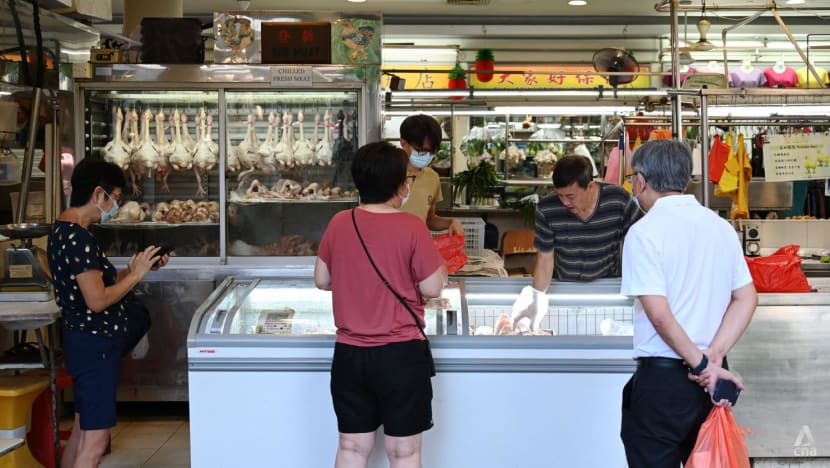How the S$1.5b support package aims to help Singaporeans cope with the rising cost of living
2.5 million Singaporeans will get up to S$500 in cash to help with rising expenses.

SINGAPORE: A new S$1.5 billion support package was announced on Friday (Oct 14) to help Singaporeans cope with the rising cost of living, with more support for lower-income households.
Building on support measures announced during this year's Budget as well as in April and June, the new package will be funded by the “better-than-expected” fiscal out-turn in the first half of this financial year. There will be no draw on past reserves.
In a press release on Friday, the Ministry of Finance said the new package, together with earlier rounds of support measures rolled out this year, will fully cover the increase in cost of living for lower-income households on average.
It added that for middle-income households, this will cover more than half of the increase in cost of living.
Here are some of the key measures:
Cash payouts to cover increase in cost of living
A one-off Cost-of-Living (COL) special payment of up to S$500 will be paid to eligible Singaporeans in December, together with the Assurance Package for GST Cash Payout announced at this year’s Budget.
To qualify for the COL special payment, the recipient must be aged 21 and above in 2023, with an assessable income (AI) of not more than S$100,000 in the Year of Assessment (YA) 2022. They must also not own more than one property.
The special payment ranges from S$300 to S$500, depending on the recipient’s AI.
Those with an AI of not more than S$22,000 will receive S$500, while those with an AI above S$22,000 but not more than S$34,000 will receive S$400.
The remaining eligible Singaporeans, who have an AI above S$34,000 but not more than S$100,000, will receive S$300.
About 2.5 million Singaporeans will benefit from the special payment.
No application is required and more details will be made available next month.
More CDC vouchers
A new tranche of Community Development Council (CDC) vouchers worth S$100 will be given to every Singaporean household in January 2023.
This is on top of the S$200 CDC vouchers announced at this year’s Budget, bringing the total to S$300.
No application is needed and the vouchers can be used at participating hawkers and heartland merchants, which will be identified by the CDC voucher decal.
You may search for the nearest participating hawkers and heartland merchants here.
The Government is also working towards allowing the donation of CDC Vouchers, with more details to be provided later.
Public transport subsidies and vouchers
First announced on Wednesday, a total of 600,000 public transport vouchers valued at S$30 will be made available to lower-income households to help them cope with an upcoming increase in bus and train fares.
From Dec 26, adult card fares will increase by 4 cents for journeys of up to 8.2km and five cents for anything longer than that.
Students, senior citizens, lower-wage workers and people with disabilities, will also see an increase in concession card fares but this will be capped at 1 cent per journey.
Similar to last year’s Public Transport Vouchers exercise, it will cover resident households with a monthly household income per person of not more than S$1,600.
The vouchers can be used to top up fare cards or buy monthly concession passes, and must be redeemed by Mar 31, 2024.
As part of the S$1.5 billion support package, the Government will also set aside S$200 million to mitigate the impact of the fare increase on commuters and pay for higher costs of providing public transport services due to the increase in energy prices, manpower costs and inflation.
This is on top of the current subsidies of more than S$2 billion per year to run bus and train services.
Financial assistance for more students
The Ministry of Education (MOE) will raise the income eligibility criteria for financial assistance schemes to help defray school expenses such as textbooks and transport for more students.
Under the revised criteria for financial assistance schemes for primary, secondary, and pre-university students - those with a gross monthly household income (GHI) or per capita income (PCI) of not more than S$3,000 and S$750 respectively will be eligible for financial aid.
This is up from the current GHI and PCI criteria of not more than S$2,750 and S$690 respectively.
This applies to schemes including the MOE financial assistance scheme (MOE FAS) for Government and Government-aided Schools (GGAS) and Specialised Schools (SS), the Special Education FAS for MOE-funded SPED schools, and will take effect from Jan 1, 2023. Applications can be made through the respective schools.
As for government bursaries for post-secondary education institutions and enhancements of the bursary quanta for full-time Institute of Technical Education students, this will take effect from the assessment year of 2023.
It comes after MOE announced in August that it would increase transport and meal subsidies for primary and secondary students under its financial assistance schemes and bursaries for pre-university students from Jan 1, 2023.
Meanwhile, government bursaries for diploma and undergraduate students are currently being reviewed by MOE, with more details to be shared when ready.
















